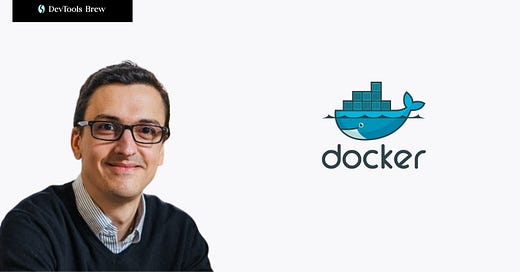DevTools Brew #38: Docker's 10-Year Journey: Successes, Setbacks, and Lessons Learned
Hey folks, welcome to DevTools Brew #38!
If you're new here, my name is Morgan Perry, co-founder of Qovery, and every Saturday, I share the stories, strategies, and insights behind the most successful devtool companies.
In this Issue #38:
📈 Docker's 10-Year Journey: Successes, Setbacks, and Lessons Learned
⭐ Star History Weekly Pick
I hope you will enjoy this new edition.
Let's dive in!
📈 Docker's 10-Year Journey: Successes, Setbacks, and Lessons Learned
As Docker celebrated its monumental 10-year milestone, Sam Alba, a pivotal figure in Docker's evolution, shared reflections on the transformative journey. Sam's retrospective analysis revealed significant successes and key missteps in Docker's decade-long narrative. Let's dive into his key learnings 👇
Key Insights
3 Things We Got Right ✅
Pioneering Containers: Redefining Infrastructure
DotCloud's Innovative Approach: DotCloud's inception marked a paradigm shift in Platform as a Service (PaaS) by supporting multiple languages, distinguishing itself from competitors confined to single-language stacks.
Early Identification of Infrastructure Gap: Recognizing the limitations of virtual machines (VMs) as the primary infrastructure tool, the quest for a more agile and isolated environment led to the birth of microservices patterns.
The Emergence of Containers: Containers emerged as a lightweight solution, enabling the isolation of customer namespaces (compute, network, storage) while efficiently hosting multiple developer apps on a single machine.
Open-Sourcing Docker: Docker's genesis from DotCloud's core component—an open-source container runtime—propelled its rapid growth, redirecting the company's trajectory towards container orchestration and networking.
Developer Focus: Catalyzing Transformation
Addressing Developer Pain Points: Docker's pivotal focus on developers' needs aimed at reducing overhead, distractions, and facilitating effective collaboration.
Acquisition and Integration: Strategic acquisitions like Fig (later Docker Compose) by Ben Firshman and Anand Prasad reflected the alignment with the YAML model from DotCloud, streamlining services and reinforcing developer-centric solutions.
Continued Evolution: While Docker made substantial strides, recognizing the need to expand beyond containers to orchestrate pipelines remained a priority, leading to initiatives like Dagger—a programmable CI/CD engine utilizing containerized pipelines.
Community Building: A Strong Foundation
Community-Centric Approach: Docker's emphasis on community-building underscored the necessity of collective engagement for progress, epitomized by the inception of DockerCon.
Catalyst for Collaboration: DockerCon transformed into an industry-leading platform that united talented developers, catalyzing the transformation of both the company and the tech landscape.
Legacy in Open Source: Docker's legacy lives on through the numerous open-source projects and communities fostered under the Cloud Native Computing Foundation (CNCF) umbrella, fostering ongoing innovation and collaboration.
3 Things We Got Wrong ❌
Adoption vs. Monetization: Balancing Open Source and Commercial Endeavors
Strategic Open Source Approach: Docker's approach centered on open source, aiming to integrate commercial solutions within the broader community framework.
Challenges in Business Viability: Striking a balance between catering to open source contributors and fostering a commercially sustainable model posed challenges, leading to a prolonged path towards establishing a robust business foundation.
Team Culture: The Evolution and Fragmentation
Undefined Core Values: The absence of early-defined core values contributed to an evolving team culture, heavily influenced by external community dynamics rather than an internal, cohesive vision.
Divided Priorities: The segregation between teams focusing on open source community and commercial aspects led to internal conflicts, impeding integrated efforts towards shared objectives.
Containers as the Singular Focus: Limitations in Vision
Overemphasis on Containers: Docker's profound success with containers inadvertently led to an oversight of broader developer supply chain needs, limiting the focus on holistic development.
Incomplete Revolution: While containers unlocked immense value, unaddressed areas, especially in CI/CD and software automation, resulted in a fragmented community, leaving the industry's transformation incomplete.
The retrospection on Docker's journey unveils critical lessons that reshaped the tech landscape and inform the next phase of innovation.
—> To explore more, read the full story here - published initially in The New Stack.
⭐ Star History Weekly Pick
The Star History Weekly Pick is:
ScratchDB: “An open-source alternative to BigQuery, Redshift, and Snowflake. Runs on Clickhouse.”
⭐️ 877 stars reached
It’s already over! If you have any comments or feedback, you can reach out to me on LinkedIn or Twitter.
Thanks for reading,
Morgan
There are no ads in my newsletter. All I ask is you subscribe, share, and enjoy! :)





